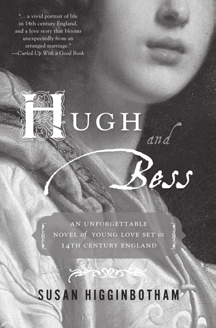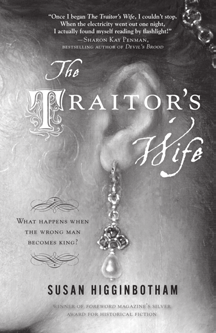The Stolen Crown: The Secret Marriage That Forever Changed the Fate of England (55 page)
Read The Stolen Crown: The Secret Marriage That Forever Changed the Fate of England Online
Authors: Susan Higginbotham
John Gillingham, ed.,
Richard III: A Medieval Kingship.
New York: St.
Martin’s Press, 1993.
Ralph Griffiths and Roger S. Thomas,
The Making of the Tudor Dynasty.
Gloucestershire: Wrens Park, 1998.
P. W. Hammond,
The Battles of Barnet and Tewkesbury.
New York: St.
Martin’s 1993.
Barbara J. Harris,
Edward Stafford: Third Duke of Buckingham, 1478–1521.
Stanford: Stanford University Press, 1986.
Michael Hicks,
Edward V: The Prince in the Tower.
Gloucestershire: Tempus, 2003.
Michael Hicks,
False, Fleeting, Perjur’d Clarence: George, Duke of Clarence
1449–78.
Gloucester: Sutton, 1980.
t h e s t o l e n C r o w n 3 7 9
Rosemary Horrox,
Richard III: A Study in Service.
Cambridge: Cambridge University Press, 1991.
Michael K. Jones and Malcolm G. Underwood,
The King’s Mother: Lady
Margaret Beaufort, Countess of Richmond and Derby.
Cambridge: Cambridge University Press, 1995.
J. L. Laynesmith,
The Last Medieval Queens.
Oxford: Oxford University Press, 2005 (paperback edition).
Arlene Okerlund,
Elizabeth: England’s Slandered Queen.
Gloucestershire: Tempus, 2006 (paperback edition).
A. J. Pollard,
Richard III and the Princes in the Tower.
Gloucestershire: Sutton, 2002 (paperback reprint).
Nicholas Pronay and John Cox, eds.,
The Crowland Chronicle Continuations:
1459–1486.
London: Richard III and Yorkist History Trust, 1986.
Carole Rawcliffe,
The Staffords, Earls of Stafford and Dukes of Buckingham
1394–1521.
Cambridge: Cambridge University Press, 1978.
Charles Ross,
Edward IV.
New Haven and London: Yale University Press, 1997.
Charles Ross,
Richard III.
Berkeley and Los Angeles: University of California Press, 1981.
Cora Scofield,
The Life and Reign of Edward IV.
London: Longmans, Green and Co., 1923 (2 volumes).
Acknowledgments
In writing this novel i was greatly aided by the resources of the Richard III Society, the publications and programs of which are invaluable for anyone doing research into this time period. I would especially like to thank the former research librarian of the Society’s American branch, Brad Verity, who provided invaluable genealogical information on the Woodville siblings to me. I have also profited greatly from online discussions with Society members, who have graciously tolerated my own views of Richard, which in many cases are quite opposed to their own.
Thanks must also go to Sara Kase, my editor at Sourcebooks, whose eye has been invaluable, and to my newfound agent, Nicholas Croce.
As ever, my main thanks go to my family. My parents, Charles and Barbara Higginbotham, have been a constant encouragement to me. My children, Thad Coomes and Bethany Coomes, have borne graciously my obsession with the Wars of the Roses. My husband, Don Coomes, has patiently tolerated the encroachment of two bookshelves stuffed with Wars of the Roses materials into the marital bedroom. I cannot think of better people to spend my life with than these.
Finally, I must repair omissions in my previous acknowledgments by mentioning other family members. My cats, Ginny, Stripes, and Onslow, have diligently kept my reading chair and my computer chair warm for me when I am not sitting in them. Boswell, my cairn terrier, standing guard by the sliding glass door in the kitchen, has protected my workspace against
t h e s t o l e n C r o w n 3 8 1
countless invasions by local squirrels, rabbits, and deer, all undoubtedly on a relentless quest to sabotage my hard drive. He has earned all of the many treats he has received during the writing of this novel.
Reading Group Guide
1. Lord Hastings tells Harry that Edward married the only woman who refused to go to bed with him. Do you think Edward married Bessie out of pure lust? Or do you think he picked her because he respected her denial of him?
2. Harry is named after the king for whom his family fought, rather than after his father and grandfather. What does this say about loyalty in the fifteenth century?
3. Harry supports several of Richard’s heinous actions because he loves his friend. Do you sympathize with Harry or do you think he should have seen the fault in Richard’s actions?
4. Like most major events throughout history, a tiny spark can incite a fire. Do you think this marriage between Bessie and Edward is responsible for all the warring? Or was it the excuse needed to justify a grab for the throne?
5. Kate is married to Harry when she is just seven years old and he is ten.
Although they dislike one another at first, their love seems to blossom as they grow older. What makes their relationship so much stronger than those of other members of the court, who seem to merely tolerate their spouses?
6. John marries a woman forty-five years his senior in order to increase his wealth. His wife, on the other hand, marries him in order to have a companion. Are these motivations acceptable for marriage? Is marriage just a deal to be made for the betterment of both parties?
t h e s t o l e n C r o w n 3 8 3
7. The morning after Harry and Kate consummate their marriage, Kate is pleased to learn that the entire court knows. Cecilia remarks about the bed sheets, King Edward jokingly calls her a minx, and the Duchess of Exeter teases her about being ridden. How did you feel about the court discussing Harry and Kate’s sex life so openly? How would such behavior be taken today?
8. When Richard finally tells Harry that he loves him, Harry realizes that he has been waiting for those words of validation for fourteen years.
Does Richard really love Harry? Or does he just use Harry’s love to manipulate him into doing his bidding?
9. Harry violently rapes his wife after she insults Richard and spits in Harry’s face. Months later, after he has repented of all his wrongdoings, she forgives him. Would you be able to forgive in such a situation?
10. Unlike his brother George, who openly rebels against Edward’s reign, Richard waits until Edward is dead to reach for the throne. First he becomes protectorate of the young king, but he quickly broadens his horizons to aim for the kingship for himself. Which brother do you think is worse—openly rebellious George or patiently power-hungry Richard?
11. Harry is distraught when his only brother dies of consumption. Kate also loses all her brothers by the time Henry Tudor takes the throne.
How important are sibling relationships in this novel? Are they more or less important than spousal relationships?
12. Harry and Kate both brag about their high social standings when they are young children, when neither of them has done anything to deserve his or her title. How would you feel living in a time period when your name and your family history are the predominant factors in your chance for success? Are there times today when family name plays a large role in social standing?
13. The public’s loyalty constantly sways as king after king is forced off the throne. With all the upheaval and treason, is loyalty represented as a good quality to have? Or does loyalty bring danger as power shifts from king to king?
3 8 4 s u s a n h i g g i n b o t h a m 14. Richard tells Harry that “Edward the king will prevail over Edward the son and brother” when Edward is forced to execute George for his treason. Would you be able to make this same decision if you were in Edward’s shoes? Would you choose to protect your kingdom over your brother?
15. Harry is easily duped by Richard because he loves him and trusts him.
He doesn’t see that he’s committing treason and usurping the rightful king. How would you have responded in that situation? Have you ever been led astray because of your love for someone?
16. Kate dislikes Richard from the moment Harry starts raving about how wonderful he is. Is this dislike a result of jealousy? Or does Kate see the latent danger in Richard?
17. After reading the first chapter of this novel, we know that Harry is going to die. Later we learn that Kate is telling her story twelve years after Harry tells his, meaning that Harry is already dead. How did this knowledge affect the way you read the novel?
18. When Harry is beheaded, he meets Uncle Edmund in the afterlife.
Why do you think Harry meets Uncle Edmund, a man he barely knew, rather than his mother or his beloved brother Humphrey?
19. Several characters in
The Stolen Crown
experience losses of those close to them: Harry, with the death of his brother and the loss of his friendship with Richard; Bessie, with the murder of her two sons and the death of her husband; Kate, with the murder of her father, brothers, and husband. Who do you think suffers the greatest loss in this novel?
20.
The
Stolen Crown
begins with a secret—the wedding between Bessie and Edward. It seems everyone has a secret to keep from someone else—suspicions of treason and knowledge of the whereabouts of others. Do you think some of the loss and tragedy could have been avoided if everyone were more open with their information?

About the Author
Susan Higginbotham lives with her family in North Carolina and has worked as an attorney and as an editor. Her first two historical novels,
The Traitor’s Wife
and
Hugh
and Bess
, were republished by Sourcebooks in 2009;
The Traitor’s Wife
won the gold medal for historical/military fiction in the 2008 Independent Publisher Book Awards. More about Susan’s
Tim Broyer
novels and the historical background to them can be found on her website, www.susanhigginbotham.com, and on her blog, Medieval Woman.


Also Available
The Traitor’s Wife
978-1-4022-1787-6 • $14.99 U.S./$15.99 CAN
It is an age where passion reigns and treachery runs as thick as blood. Young Eleanor has two men in her life: her uncle King Edward II, and her husband Hugh le Despenser, a mere knight but the newfound favorite of the king. She has no desire to meddle in royal affairs—she wishes for a serene, simple life with her family. But as political unrest sweeps the land, Eleanor, sharply intelligent yet blindly naïve, becomes the only woman each man can trust.
Fiercely devoted to both her husband and her king, Eleanor holds the secret that could destroy all of England—and discovers the choices no woman should have to make.
Hugh and Bess
978-1-4022-1527-8 • $14.99 U.S./$18.99 CAN/£7.99 UK
Amid her dreams of a wealthy, handsome man who would sweep her off her feet, young Bess de Montacute never thought she would end up with the son and grandson of disgraced traitors. How could she ever be happy with a man with such a vile past?